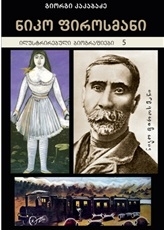NIKO PIROSMANI
Niko Pirosmani – In Search of Faded Innocence is a documentary novel about one of the most significant and on the same time mysterious individuals of Georgia-a self educated painter Niko Pirosmani. Abundant historical and documentary materials make this book an innovative and extraordinary piece of Georgian literature. Rather than being another biography, which reinstates almost all previously ascribed misconceptions, Giorgi Kakabadze’s novel is a rare attempt to collect authentic data about the great artist and then carefully shape it in the framework of a bestselling novel. For the first time ever a reader is made familiar with texts which for various reasons were forgotten or forbidden years back. In addition the author guides the reader into the historical background of the early 20th century, invariably penetrates into Pirosmani’s genuine creative context and thus offers a key to the authentic comprehension of his works. Giorgi Kakabadze has succeeded in removing the alleged mythical haze surrounding the artist and describes a freedom loving individual whose original talent could distinguish the Georgian art from the Russian orbit and pave a way along the totally unique path of independence. The novel also confronts the purely artistic issues and gives a thorough analysis of Pirosmani’s creative realm. The author attempts to reconsider the artist’s works, which enhances the status of Pirosmani in the world of art heritage. Pirosmani no longer belongs to a group of mediocre primitivist artists, but ranks among the most advanced individualist and post impressionist artists of the world – such as Gauguin, Van Gogh, Toulouse Lautrec, Cezanne and others. The book is not only a biographical novel, but a professional research of the artist’s personal and creative life as well. The author reveals a strong logical consistency in his narration and manages to portray Pirosmani’s tough lifestyle as well as controversial and unveiled historical facts, the great artist’s date of death among them. The novel also tells of Georgia’s social history, its troublesome historical timeline which became a platform for personal individualism and collective consciousness, conventional artists and avant-garde trends, invariable struggles of a personality for freedom as well as of the whole country for freedom. The author artfully varies the capacity of historical developments and offers a novel interpretation of a new epoch.
EXTRACT
Translated into German by Mariam Kamarauli
Abschnitt XII
Eldorado – Das Paradies am Ufer der Kura
Auf Niko Pirosmanaschwilis (so lautet Pirosmanis georgischer Name) Spuren trifft man in den Restaurants und Gartenlokalen von Ortatschala¹. Dort arbeitete er an den Aufträgen des Wirts vom Eldorado Tititschijev. Das Eldorado befand sich in der Woronzowi Straße 102, nicht weit vom Argentina – beides bekannte Wirtshäuser in Tiflis, die Ende des 19. bis Anfang des 20. Jahrhunderts sehr populär waren.
Ohne Zweifel wussten die Gastwirte, dass Pirosmani kein Dach über dem Kopf hatte, und bis zur Erledigung ihrer Aufträge ließen sie den Maler bei sich wohnen. Davon profitierten alle: Pirosmani hatte einen Ort für die Nacht und verlor keine Zeit durch lange Wege zu seiner Arbeit. So konnte er die Aufträge noch schneller erledigen. Um sechs Uhr morgens begann er sein Tagewerk und arbeitete bis spät in der Nacht. Und auch seine Auftraggeber waren damit zufrieden, weil er so nur ein paar Tage für seine Arbeiten brauchte, was sie weniger Geld kostete.
Pirosmani musste seine Arbeitsstätte auch gar nicht verlassen – er wohnte in einem herrlichen Garten Eden. Hier war er bestens versorgt, seine ganze Zeit verbrachte er an der Staffelei und malte. Im Eldorado wurden nur abends Gäste erwartet, deshalb war es dort tagsüber ziemlich ruhig. Die Hausmädchen wischten und fegten, die Köche nahmen von den Lieferanten die frischen Lebensmittel und Getränke entgegen und bereiteten sich auf die Bewirtung der Gäste vor. Möglicherweise wurde Pirosmani in solchen Momenten von absoluter Ruhe ergriffen. Für einen Künstler gibt es nichts Wichtigeres als die Befreiung von alltäglichen Problemen, weil er nur so seine ganze Aufmerksamkeit der Kunst widmen kann und so den Höhepunkt seiner Kreativität erreicht. Für Pirosmani war dieses Milieu kein Ort von zweifelhaftem Ruf. Im Gegenteil, dies war für ihn das verlorene Paradies... (See PDF)
In case of using the information, please, indicate the source.
